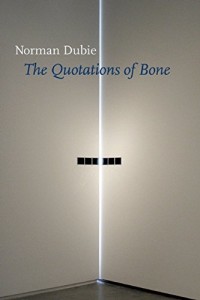 The Quotations of Bone
The Quotations of Bone
Norman Dubie
Copper Canyon, 2015
No one goes to a Norman Dubie poem for grace. Whether in his celebrated earlier work, rooted in historical monologue, or his poetry since the 90’s, evocative of a strange and flowing historical present, Dubie’s poems are characterized by hair-raising imagery, ponderous disjunction, and a proclivity for weighty philosophical questions. In one section of “The Fallen Bird of the Fields,” among the best poems in his twenty-ninth book, The Quotations of Bone, he collapses time around a family killed in a horrific car wreck:
…the smoke
there since morning, a feint
or slight off a coroner’s cigar— his
Cuban cologne over the father’s
burst stomach with undigested painkillers
there like glistening fish roe, row
all your poor wooden boats
gently away from me, this old woman
crippled with a bitter affection
for these lost broken-pottery cultures
that dug this canal
a thousand years before the early morning
and the dead children
singing— here comes the sun—
for their mother’s breakfast.
The “fish roe” horror of the corpse is elided into a song, into a speaker whose historical memory reaches back to the region’s forgotten first people, back to another song’s renewal haunted (we know, but the song doesn’t) by the ghastly fate awaiting the singing children. There’s nothing subtle in this passage, but the energy of its motion through its material takes the reader’s breath away.
Later, in “The Butterfly House,” the speaker’s anxiety and mourning at searching through the belongings in (his dream of?) his grandmother’s abandoned home ends in a pileup of ecstatic images:
A brass pressure cooker and two parakeets
begin again their conversation.
The older bird
lamenting the loss of a white shoelace.
Hail shoots from the black cloud bank
above the lake.
My grandmother’s apron drifting to the floor.Flames breaking blades in the fieldstone fireplace.
The verbal music of the final line rings in the reader’s ear as the consciousness of the speaker dilates around the moment of entering the home, to a vision of fire that’s consumption and renewal at once.
Dubie’s work has always had the urgency of swiftly-taken dictation. He grounded his early monologues (of Czar Nicholas, Thomas Hardy, Ovid, Virginia Woolf, and countless others) in scrupulous historical fact. But the elasticity of his late work allows his poems to pursue things less factual than artifactual, tiny pieces of history: raw milk, clockwork, burial boats, red slate. But this disjuncture, and the power Dubie grants his vivid images, means that his poetry constantly risks bathos. The bad poems in Quotations—and there are many, many bad poems—don’t fizzle out, but come crashing down spectacularly. “The Jerusalem Moniker” ends:
Actually, that old fart
Samuel Beckett knocked up
the poor horse in a cool dark shed
in Palestine.
That’s Palestine with two n’s. Don’t forget it.
The authorities will question all of us in the smart set.
The gum and lambskin
prophylactic failed. I warned you—
it’s the details of winter that upset us.
A lot of poems wind up as ridiculously as “The Jerusalem Moniker” here, particularly when Dubie’s penchant for science fiction burbles up (Dubie peppers his historical scenes with beneficent or nonplussed alien visitors), or when he tries for absurd wit (“Shit,” he has Shakespeare think, “I’ll be lucky to live out the week”). The mighty energy of Dubie’s poetry often feels like an instrument he can’t (or won’t challenge himself to) temper with other qualities.
But for all the disasters in Quotations, its best poems—usually its sequences—retain an intense moral force. This force doesn’t derive from outrage, exactly, though Quotations does include straightforward condemnations of American imperialism and state violence. Rather, it derives from a sense of sustained simultaneity, deepened by Dubie’s long engagement with Buddhism. Beyond our attempts to rationally order our experience of life, his poems suggest, all things share a common being: all voices mingle, and distance collapses into immediacy.
…The stink
of pulp mills, father said,is a Russian summer of old cabbages fried
a second time in horse fat.
It is very inert after that…
Dostoevsky telling us
it all ends in a world of symbolism
with a dog barking at a dead woman
in her long cortege.
The American philosopher and scholar of Japanese Buddhism, R.H. Blyth, once wrote of the sacred value of nonsense in art: that the nonsense of a koan is metonymic of the realm “in which there is no intellect, no emotion, no beauty, no morality, no unifying principle, no order of any kind, natural or super-natural.” Thus, nonsense points us beyond any relative knowing and toward the absolute. The surface disorder of Dubie’s poems, disrupting the usual “logic” of history and the boundaries of identity, work similarly. In Dubie’s best work (and there is a little of it here and there in Quotations), past and present suffering, outrageous and mundane life, are welcomed into a poetry whose disjuncture and vividness suggests a compassion beyond order or knowledge.
—
By Jay Aquinas Thompson | Contributing Editor
